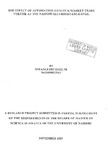| dc.description.abstract | This study investigated the effect of automation on stock market trade volume at the Nairobi Security Exchange (NSE). Two study periods were considered, pre-automation (January 2002 to June 2006) and post-automation periods (July 2008 to December 2012). This study provides empirical analysis of stock volume before and after automation at NSE. The study was a quantitative case study and considered data on monthly accumulated stock volume on 31 NSE listed companies from January 2002 to December 2012. Secondary data was used in this analysis. Descriptive statistics was used for analysis together with a t-test was used to test the significance. The results indicate that the introduction of the ATS had no statistically significant effect on stock volume at the NSE. However, few companies showed that there was an effect on the companies’ stock volumes traded after automation, which may have been caused by other factors which were not considered in this research, including either
organizational, macro or micro economic and therefore unrelated to the system introduced.The study is important as it appreciates and underscores the effect of continued change in technology is having on the mobilization of resources in stock and securities exchanges in Kenya and around the world. | en_US |

